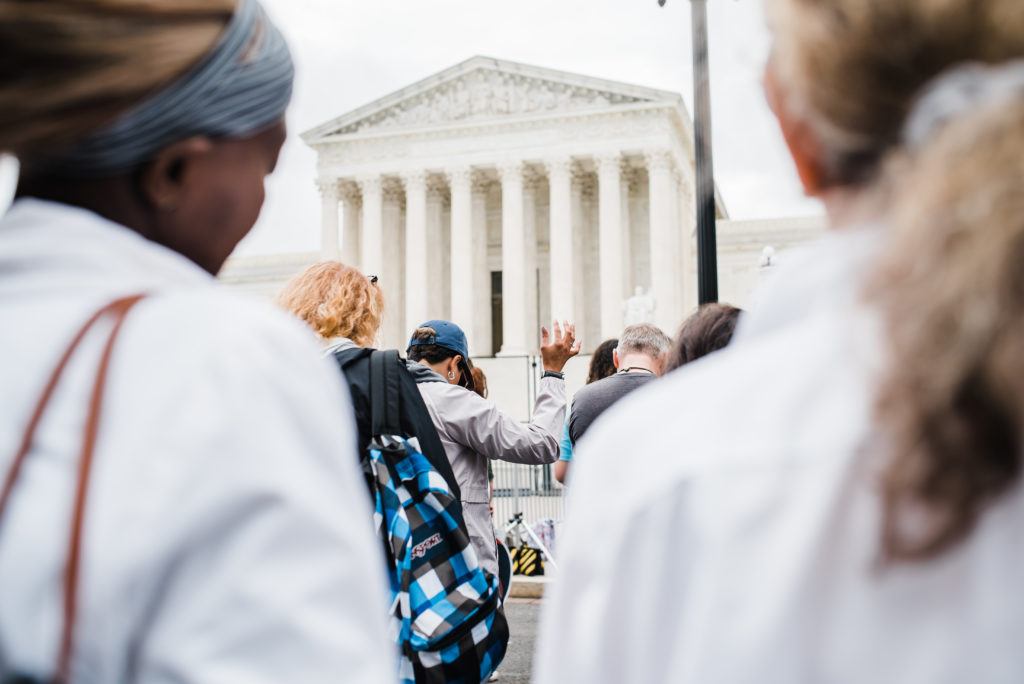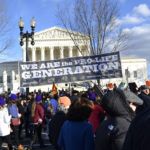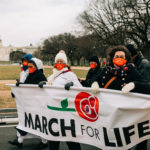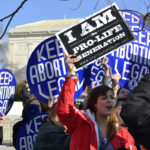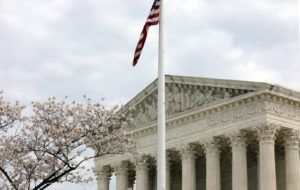
WASHINGTON (BP) – The U.S. Supreme Court put an end Friday (June 24) to a nationwide abortion regime that lasted nearly half of a century and resulted in the deaths of more than 60 million preborn children.
In a 5-4 opinion, the high court overturned the 1973 Roe v. Wade decision that struck down all state abortion bans and legalized the procedure throughout the country. The justices also invalidated the 1992 Planned Parenthood v. Casey opinion that affirmed Roe.
The watershed decision in Dobbs v. Jackson Women’s Health Organization – a case regarding Mississippi’s prohibition of the abortion of preborn children whose gestational age is more than 15 weeks – returns policy decisions on the issue to the states and marks a long-sought-for victory for the pro-life movement.
Messengers to the Southern Baptist Convention’s annual meetings have called for the end of legalized abortion through a series of pro-life resolutions adopted since 1980. At the 2022 meeting June 14-15, messengers approved a resolution that urged the Supreme Court to overturn Roe and Casey and encouraged states to enact pro-life policies.
“Southern Baptists rejoice at the ruling” by the high court, said newly elected SBC President Bart Barber in a written statement Friday.
The principles manifested in more than four decades of SBC resolutions “have motivated both our consistent support of the pro-life movement and our consistent support of crisis pregnancy centers, ministries to low-income families, foster-care and adoption agencies, and other ministries of mercy to people in need,” he said.
Barber pledged that Southern Baptists will continue their pro-life work “[s]tate-by-state, mother-by-mother, heart-by-heart.”
Brent Leatherwood, acting president of the Southern Baptist Ethics & Religious Liberty Commission (ERLC) said the high court’s opinion “marks a true turning point in the pro-life movement, as Christians, pro-life activists and many others have worked tirelessly for 50 years to see this moment in our nation’s history. Their commitment to uphold human dignity and justice has achieved the most significant victory in the history of the pro-life movement.”
“The issue of abortion has now been turned over to the states, many of which have either implemented or are considering some of the most abhorrently permissive pro-abortion proposals ever,” Leatherwood said in an ERLC release. “[L]et us rejoice that we live in a nation where past injustices can still be corrected, as we also roll our sleeves up to save preborn lives, serve vulnerable mothers, and support families in our communities.”
Elizabeth Graham, the ERLC’s vice president of operations and life initiatives, described the decision as a “historic moment for the dignity of human life, and we celebrate that thousands of lives will now be saved. Yet, while we are grateful for any law or ruling that protects and defends life, the ultimate goal is for every person, born and preborn, to be protected and seen with inherent dignity and value.
“[T]omorrow there will still be many women who will face an unplanned pregnancy — afraid, unprepared and unsure of what to do and where to turn,” Graham said in the release. “The Church has a significant opportunity to serve and support these women in crisis and their preborn children in their time of need.”
After the Dobbs decision was announced Friday, President Biden reiterated his call for Congress to codify the Roe ruling into law.
Alexis McGill Johnson – president of the country’s No. 1 abortion provider, Planned Parenthood Federation of America – said on Twitter, “The Supreme Court has now officially given politicians permission to control what we do with our bodies, deciding that we can no longer be trusted to determine the course for our own lives.”
Associate Justices Clarence Thomas, Samuel Alito, Neil Gorsuch, Brett Kavanaugh and Amy Coney Barrett made up the court’s majority in the watershed ruling. Chief Justice John Roberts wrote a concurring opinion that supported the Mississippi law but did not agree with the reversal of Roe and Casey. Joining in dissent were Associate Justices Stephen Breyer, Sonia Sotomayor and Elena Kagan.
In the court’s opinion, Alito wrote, “We hold that Roe and Casey must be overruled. The Constitution makes no reference to abortion, and no such right is implicitly protected by any” provision therein.
The judicial doctrine that calls for reliance on the Supreme Court’s precedents “does not compel unending adherence to Roe’s abuse of judicial authority,” Alito wrote. “Roe was egregiously wrong from the start. Its reasoning was exceptionally weak, and the decision has had damaging consequences.”
Instead of settling the issue, “Roe and Casey have enflamed debate and deepened division,” according to Alito’s 79-page opinion.
“It is time to heed the Constitution and return the issue of abortion to the people’s elected representatives.”
In explaining the court’s rejection of the Roe and Casey decisions, Alito said Roe’s finding that the Constitution “implicitly conferred a right to obtain an abortion … failed to ground its decision in text, history, or precedent.”
Roe “relied on an erroneous historical narrative,” he wrote, and “concocted an elaborate set of rules, with different restrictions for each trimester of pregnancy, but it did not explain how this veritable code could be teased out of anything in the Constitution, the history of abortion laws, prior precedent, or any other cited source.”
The high court’s decision followed the leak in early May of a draft opinion by Alito that indicated the high court would reverse Roe and Casey if the majority at the time remained in support.
In his concurrence, Roberts said “there is no need to go further to decide this case” than to uphold Mississippi’s 15-week abortion ban. “I am not sure, for example, that a ban on terminating a pregnancy from the moment of conception must be treated the same under the Constitution as a ban after fifteen weeks,” he wrote.
A joint dissent by Breyer, Sotomayor and Kagan charged the court with betraying “its guiding principles.” They expressed sorrow for “this Court, but more, for the many millions of American women who today lost a fundamental constitutional protection.”
The majority has discarded the balance between the rights of women and the interest of the states established by the Roe and Casey decisions, the dissenters wrote. “Across a vast array of circumstances, a State will be able to impose its moral choice on a woman and coerce her to give birth to a child.”
In its Roe decision in 1973, a 7-2 majority of the Supreme Court invalidated state laws prohibiting abortion and thereby legalized the procedure throughout the country. On the same day, the justices issued also by a 7-2 margin a companion decision, Doe v. Bolton, that had the effect of implementing an expansive right to abortion throughout pregnancy.
In its Doe opinion, the court said a woman could have an abortion after viability for health reasons. The majority decision defined “health” as “all factors – physical, emotional, psychological, familial, and the woman’s age – relevant to the well-being of the patient.”
The high court ultimately permitted states to enact some regulations on abortion in such decisions as Webster v. Reproductive Health Services in 1989 and Casey in 1992. The justices also upheld a federal law prohibiting a specific method of abortion, what is known as partial-birth abortion, in 2007.
With the overruling of Roe and Casey, 26 states are certain or likely to prohibit abortion, according to the Guttmacher Institute, a research and policy organization affiliated with the abortion-rights movement.
Chelsea Sobolik, the ERLC’s director of public policy, said, “For too long, the Roe and Casey decisions have allowed our nation to turn a blind eye to the plight of those who have no voice — to view these lives as a burden instead of a blessing.
“While this ruling is a significant step toward establishing a true culture of life, the issue of abortion will now be sent back to the states,” she said in the ERLC release. “We must continue to use our time, talent and treasure to protect the preborn, care for their mothers and advocate for state laws that protect them both.”
It is estimated more than 63 million abortions have occurred since the Roe decision, the National Right to Life Committee reported in January of this year.
